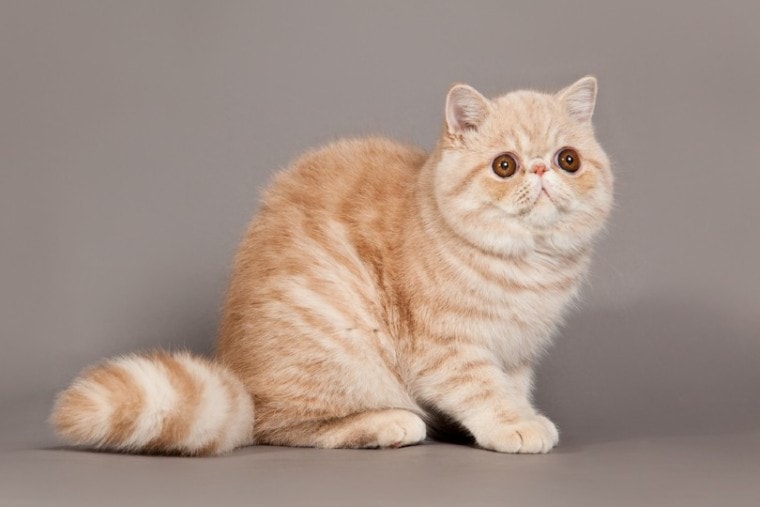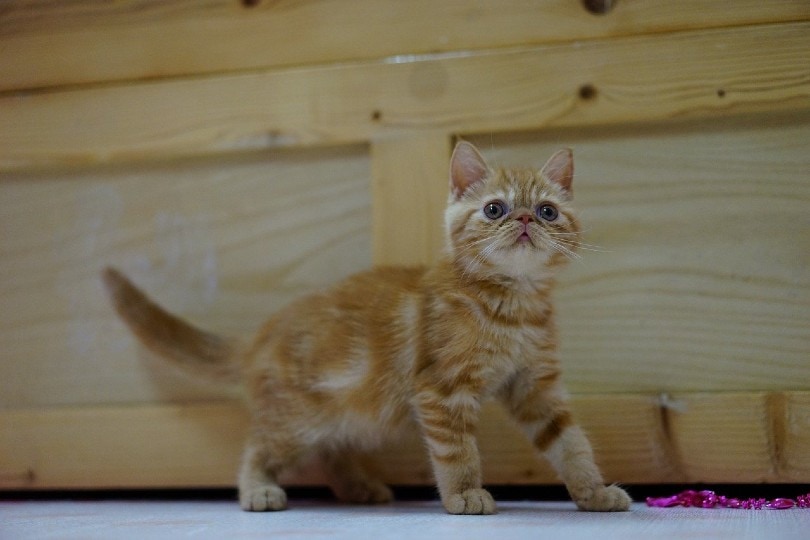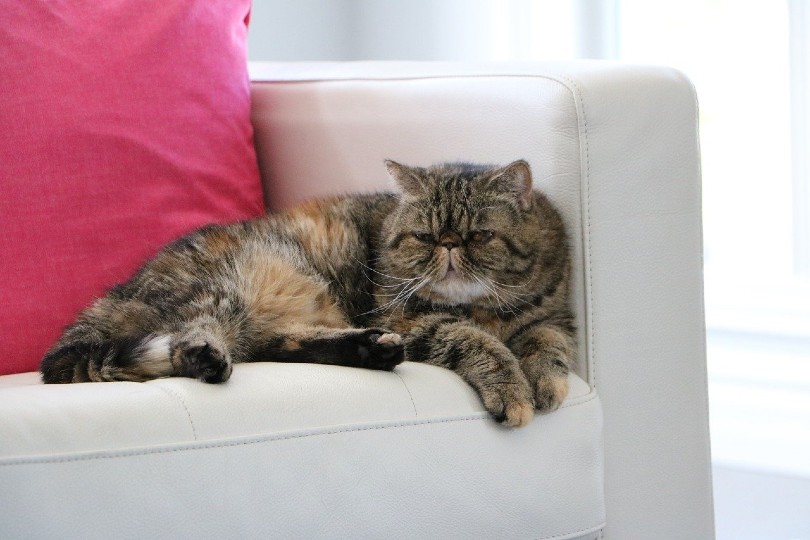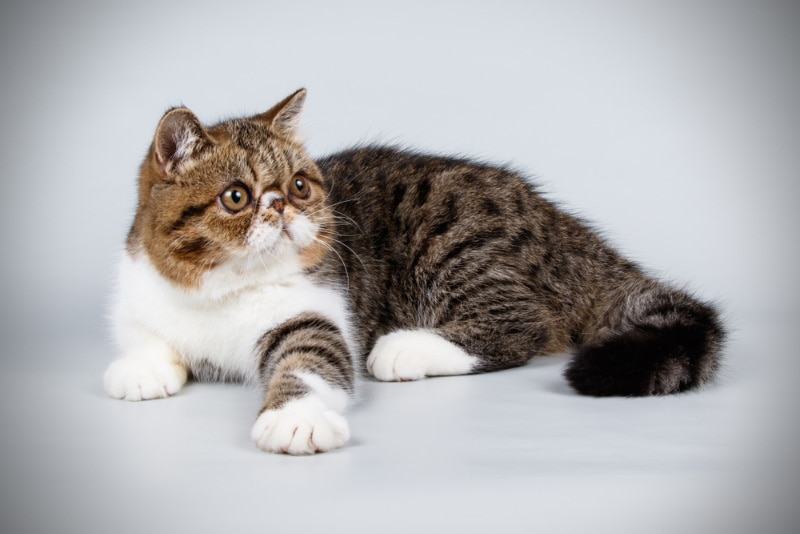
Click Below to Skip Ahead
If you’re obsessed with the look of a Persian but hate the idea of all that long hair, take a look at the beautiful Exotic Shorthair. These cats carry all of the attributes you love in a Persian, like their smoosh face, cuddly body, and superb temperament—but without long locks.
Breed Overview
Height:
10-12 inches
Weight:
10-12 pounds
Lifespan:
10-15 years
Colors:
Chocolate, lilac, white, cream, tortoiseshell, red, blue, seal, silver
Patterns:
Himalayan, bi-color, tri-color, tabby, smoke, shaded
Suitable for:
Active families, apartment living, children
Temperament:
Curious, lovable, playful, calm, well-mannered
These intensely soft-hearted, relaxed kitties are a pleasure to live with for almost any home. But don’t take our word for it—let’s learn about this fantastic breed so you can see for yourself.
Exotic Shorthair Cat Characteristics
Exotic Shorthair Kittens

Exotic Shorthair cats are popular cats due to their distinctive looks and loving personality. When looking for an Exotic Shorthair, make sure you are speaking with a reputable breeder and ask them many questions regarding the cat’s health and temperament. The likelihood of finding an Exotic Shorthair as a rescue or shelter is small, but it’s worth looking. Sometimes owners surrender their purebreds during unforeseen circumstances or their pets develop health issues they can’t afford to fix.
Exotic Shorthairs are prone to a couple of diseases, so make sure you have regular vet checkups and feed your cat a high-quality cat food. Keep reading to know what type of care your kitty will need to grow into a happy and healthy cat.
Temperament & Intelligence of the Exotic Shorthair
Exotic Shorthairs are very laidback cats that take a leisurely approach to life. They won’t get worked up or overly excited about much. These felines will want to play like any other cat. But most of the time, they are cuddling, napping, or stopping to smell the roses.
These cats love observing, taking in everything around them. They won’t get spastic or intense over small things, and they never reject a good snuggle. These easy-going companions aren’t very vocal either—but they do communicate by purring often.
These cats are docile and social, not running away whenever they hear a noise they don’t recognize. They love the time spent with their humans, furry buddies—and many times, even strangers!
Even though these cats are well-mannered and relaxed, they can also be quite curious. When they’re focused on a small moving object, you can bet they’ll investigate and chase it like any other cat. But even during play, they tend to be very gentle and poised in their approach.
Exotic Shorthairs tend to bond very closely with their owners. They can be very sensitive to new environments once they’ve built a relationship with their people. So, if you have any reason why you might not be able to commit to their lifespan, another breed might work better for the sake of the cat.

Are These Cats Good for Families? 👪
Exotic Shorthairs are perfect for families. They will get along with every person in your household, even if they have a favorite or two. They might even love the company you bring over. These cats are highly affectionate and willing to get chin rubs from just about anyone.
These cats are non-invasive and aware of boundaries. Because of their calm nature, they make excellent choices for seniors or small children. They have a graceful, dainty presence—very light on their feet. You might not even know they’re there sometimes.
Because they tend to be quiet and off to themselves, they also fare well in apartments and smaller living spaces with close neighbors. They aren’t usually destructive either, so you can have a clear mind about keeping your valuables in their place.
Does This Breed Get Along with Other Pets?
Exotic Shorthairs are exceptionally agreeable with other pets. You should still make sure they get lots of socialization early on to avoid any fear or nervousness around new animals. But this breed definitely plays well with others.
Even though these cats are very gentle, you won’t want to trust them around smaller critters they might think are prey. Even cats who have a very low prey drive can seriously hurt smaller creatures. One play session could get a bit too rough, ending up in heartbreak. So, always supervise any interaction between your cat and cage animals.
Things to Know When Owning an Exotic Shorthair:
Food & Diet Requirements 
Exotic Shorthair cats need a high-quality diet full of all recommended nutrients for optimal health. You can select from commercial recipes or try out homemade meals.
Exotic Shorthairs are known to be a bit picky at mealtime. They might have their favorites and stick to it. Alternatively, they may love food for a while and hate it eventually, so you may have a bit of trouble appealing to their taste buds.
Because of the Exotic Shorthair’s low activity levels, they might do best on a moderate to low-calorie diet. So, be mindful when you’re selecting their diet of the nutrition facts on the label.
Because these cats have flat faces, they also might benefit from tilted or shallow food dishes. These bowls will make the eating experience more enjoyable.

Exercise 🐈
We hate to admit it, but your Exotic Shorthair might be a bit—well—lazy. Especially after spaying or neutering, this cat will likely enjoy mealtime and napping over all else.
It’s still important that your Exotic gets at least 15 minutes of solid exercise per day. These cats are pretty playful, so if you initiate, they won’t turn you down.
This breed might have a select few toys that they play with. But they are most comfortable batting around a milk ring for a few minutes before they find a good perching spot.
Training 🧶
You will likely have no issues getting your Exotic to use the litter box. After a few friendly introductions, they should pick up the concept without struggle.
However, because these cats are pretty lackadaisical, they might not be so receptive to training. It could be a lack of interest or simply wanting to relax instead. But with enough time put in, they can often be taught certain routines.
Grooming ✂️
Exotic Shorthairs cats have short, plushy fur with a thick undercoat. But these cats don’t shed considerably, especially considering how dense their coat is. A weekly brushing will do just fine.
Because of their head structure, their eyes tend to seep a lot. You will have to wipe it with a soft cloth under the eyes as needed. You must also keep up with routine bathing every 4-6 weeks.
After baths, you can give them the royal treatment—clipping nails, brushing teeth, and cleaning ears.

Health and Conditions 🏥
Exotic Shorthairs do have a few health issues to talk about. First, these cats are brachycephalic, which means their skulls are shaped differently from ordinary cats. They have a smooshed-in snout that is adorable—but it does mean you have to show them special care.
Exotics should never be in extreme temperatures since it can make it hard for them to breathe. They might also require special food bowls and frequent eye-cleaning.
As with any other cat, Exotic Shorthairs need annual vet checkups, immunizations, and spaying or neutering. While specific health issues can be more prevalent in this breed, early detection is key to treatment.
Serious Conditions:
Polycystic kidney disease — this genetic condition causes multiple fluid-filled cysts to form on the kidneys.
Brachycephalic airway syndrome — this condition causes difficulty breathing in flat-faced cats.
Hypertrophic cardiomyopathy — this condition causes the thickening of heart walls, decreasing the heart’s ability to function.
Minor Conditions:
Eye drainage — like their Persian cousins, eye drainage can be a problem in your Exotic, requiring regular cleaning to avoid infection.
 Male vs. Female
Male vs. Female
Before we hash out the male and female tendencies, it’s important to note that personalities vary by individual cats. However, certain traits seem stronger in one gender or the other.
Males tend to be a little lazier and lovable than their female counterparts. Females are just as sweet, but they will give you your space a little more in comparison. Boys also might be slower to mature, staying young-minded and playful. Females get a little more down to business as they get older.
Both males and females reach sexual maturity at around 6 months of age. It’s crucial to fix your cat before this stage since both genders can spray. However, it is more common in males.
Males tend to be larger than females with bulky heads and sturdy bodies. Females are usually daintier and smaller in stature.
3 Little-Known Facts About the Exotic Shorthair Cat
1. Exotic Shorthairs Are Purring Music Boxes
You might not hear an Exotic meow often, but they will never stop purring. They’re the kind of cat you can inch toward, and they start purring instantly. They’re little bundles of love.
2. The Exotic Shorthair Has Been Dubbed “Lazy Man’s Persian.”
Exotics have the easygoing nature of a Persian with a short coat. For that reason, they picked up the nickname since they require much less grooming.
3. Exotic Shorthair Litters May Contain One Long-Haired Kitten
Contrary to their name, a purebred Exotic Shorthair might have long hair. Because of their Persian genetics, the recessive gene for long hair can come through in virtually any litter—but it’s usually limited to one.
Conclusion
These cats fit in well with virtually any household or lifestyle. These brachycephalic cats might have a few unique requirements that may be daunting for inexperienced owners because of their special facial shape.
If you do decide to add an Exotic Shorthair to your home, buy from a reputable breeder or rescue to ensure optimal health.
See also:
- Himalayan Cat: Breed Info, Pictures, Temperament & Traits
- Devon Rex: Cat Breed Info, Pictures, Temperament & Traits
Featured Image: Ewa Studio, Shutterstock







